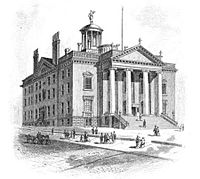48th New York State Legislature
| 48th New York State Legislature | |||||
|---|---|---|---|---|---|
|
|||||

The Old State Capitol (1879)
|
|||||
| Overview | |||||
| Jurisdiction | New York, United States | ||||
| Term | January 1 – December 31, 1825 | ||||
| Senate | |||||
| Members | 32 | ||||
| President | Lt. Gov. James Tallmadge, Jr. (PP) | ||||
| Party control | Bucktail plurality (13-10-9) | ||||
| Assembly | |||||
| Members | 128 | ||||
| Speaker | Clarkson Crolius (PP) | ||||
| Party control | Clintonian | ||||
| Sessions | |||||
|
|||||
| 1st | January 4 – April 21, 1825 |
|---|
The 48th New York State Legislature, consisting of the New York State Senate and the New York State Assembly, met from January 4 to April 21, 1825, during the first year of DeWitt Clinton's second tenure as Governor of New York, in Albany.
Under the provisions of the New York Constitution of 1821, 32 Senators were elected on general tickets in eight senatorial districts for four-year terms. They were divided into four classes, and every year eight Senate seats came up for election. Assemblymen were elected countywide on general tickets to a one-year term, the whole Assembly being renewed annually.
The previous session had been dominated by the controversy about the presidential succession, and the question how to choose presidential electors. Party lines broke down when Martin Van Buren tried to have the "Bucktails" faction of the Democratic-Republican Party support William H. Crawford for U.S. President. A large part of the Bucktails favored John Quincy Adams, Henry Clay, Andrew Jackson and John C. Calhoun as possible presidential candidates, and proposed to have the presidential electors elected by the people in districts, similar to the congressional elections. The Anti-Crawford factions became known as the "People's Party", and they joined forces with the "Clintonians" (supporters of DeWitt Clinton, opposed to the Bucktails). The rump Bucktail faction (which followed Van Buren) was called the "Regency Party" by their opponents, a reference to the Albany Regency.
...
Wikipedia
